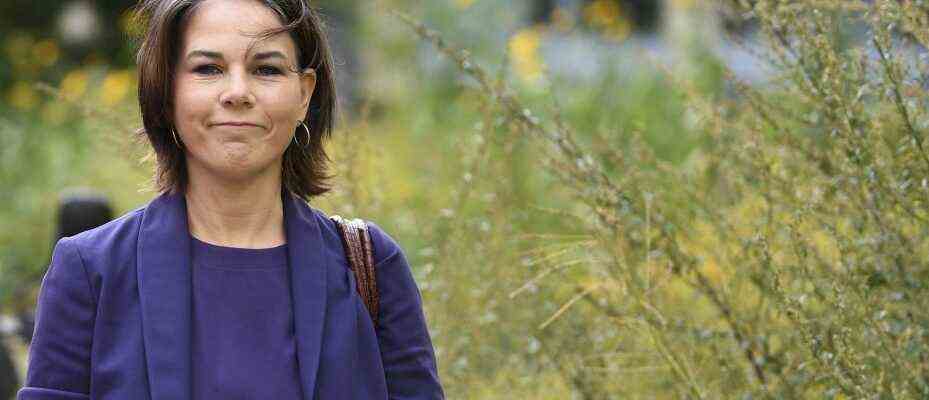So now the poker has started in the negotiations for a traffic light government. Just don’t show any shock, you look forward to things calmly, despite everything, it was said by the SPD, Greens and FDP. But behind the scenes, some have now started to vent their anger.
The Greens started with it. After weeks of good weather and an optimistic start in the government talks with the SPD and FDP, the party pulled the brakes on Thursday: The schedule according to which Olaf Scholz (SPD) should be elected Chancellor in the week of December 6th is not to be held if the previous negotiation results are retained. The party leader Annalena Baerbock followed up on Friday. “We can not say when it is finished,” she said on the RBB information radio. What was meant was the coalition agreement.
Actually it should be ready on November 22nd, now it could be the beginning of December, according to the Greens. Because, unlike the SPD and FDP, they do not have the contract voted on at a party congress, but in a digital primary election, ten days are necessary between the coalition agreement and the election of the chancellor. That would be difficult if the content remained so tough, Baerbock said. “We have to meet a little more intensively.” The traffic construction site in particular is said to be “huge, huge”.
From the perspective of the Greens, the traffic light negotiations are stalling. There are problems with the climate and finances, but apparently also with the question of how cars with internal combustion engines are being replaced by electric vehicles. The subject of the Federal Transport Infrastructure Plan and support for industry in the area of climate change should also be complicated. The same applies to basic security for children, species protection, agriculture and apparently also the reform of citizenship law.
The green negotiators are under pressure
Only three of the 22 traffic light working groups had satisfactory negotiation results, according to the Greens. Whether this is true cannot be verified, as the negotiators do not want to reveal anything substantial. However, what penetrates outside sometimes smells sulphurous for some greens. You are under pressure.
Eight climate and environmental associations have written a letter to the Greens. The exploratory paper of the traffic light is too vague to advance climate protection. The party leadership wrote back that they should stay tuned. However, too little was achieved, said the leading Greens. They don’t want to completely smash the traffic light china, but set an example with the warning that the schedule is shaky. Green circles reject the fact that it was a mistake to make too many concessions to the FDP in the explorations in order to make it easier for it to change political camps. It was necessary to accommodate the FDP at the beginning, otherwise the alliance would have failed immediately.
But someone else seems to spoil the Greens’ mood: the SPD. When it comes to climate policy, little can be expected from Olaf Scholz, it was said even before the negotiations. In the meantime, however, the SPD is also opposing the Greens on issues such as escape or tenancy law. Their basic assumption is crumbling that they are politically closer to the SPD than the FDP, thus having a natural ally and therefore being able to go far towards the FDP.
Social Democrats react annoyed
All the important reforms had to be fought against the SPD in the past, you can also hear: the Renewable Energy Sources Act, nature conservation, marriage for everyone. So it is no surprise that the comrades stuck to the familiar while the Greens wanted to change. But it is emphasized that you take it calmly. There will be movement in the matter with the others.
In the SPD, negotiators reacted with amazement, sometimes even annoyed: The Greens spread a bad mood. But you don’t want to fuel the anger any further. The Greens are “just totally under pressure,” according to an insider. But the impression that there has been too little substantial progress in the talks does not reflect the real mood.
In general, the SPD seems to have a different approach than the Greens. The SPD had already kept the election manifesto more concise and much more vague than in previous years. If it were up to Scholz alone, only the really central projects would be in the coalition agreement. In the day-to-day running of government, the partners have to deal with so many things that are not yet known. He also wants the traffic light to be more than just processing a contract. The Prime Minister of Rhineland-Palatinate, Malu Dreyer, was “very confident” that the coalition negotiations would be on schedule. “It is quite normal that one or the other party is more satisfied or dissatisfied during the negotiations,” she said in the ZDF morning magazine.
A role reversal is emerging
And even in the FDP, calm can be heard in view of the Greens’ braking maneuver. As before, there is probably the will not to step on the feet of the negotiating partners. Perhaps it is part of the irony of the traffic light negotiations that, compared to the Jamaica explorations in 2017, there are now signs of a role reversal. At that time it was the Liberals who felt ripped off by the Union and the Greens. Because the Greens were the only ones to change political camps at that time, the Union tried to make it palatable to them with an extra helping of devotion. This time the signs are reversed: it is the Liberals who have been made easier to change camp with concessions, while the Greens are rowing. How the matter will be solved, no one is yet able to say.

